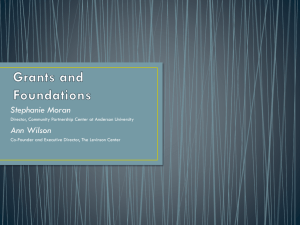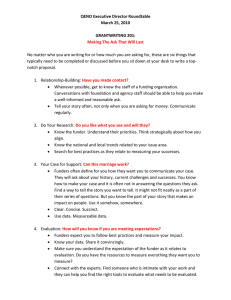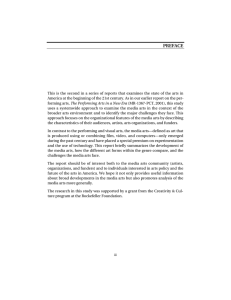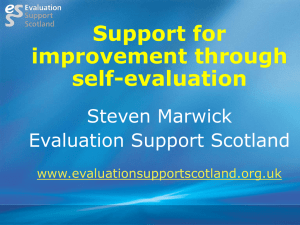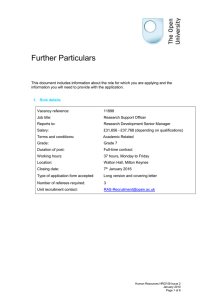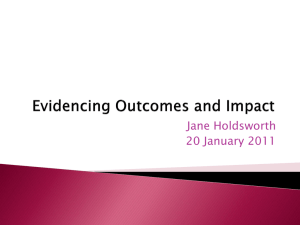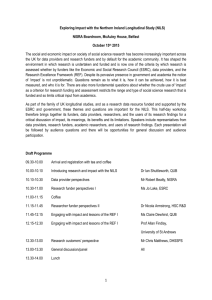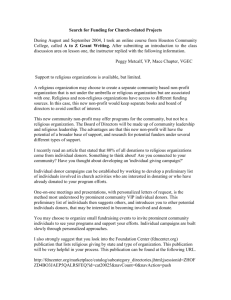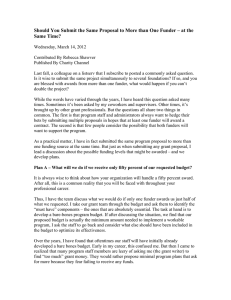Successful funding bids
advertisement
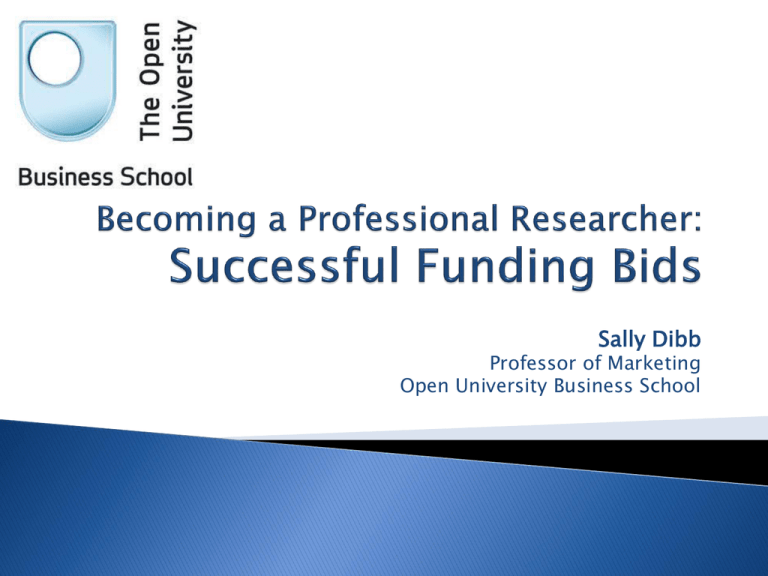
Sally Dibb Professor of Marketing Open University Business School Research active academics are expected to attract external research funding Good for the University, brings money and profile, contributes to REF, accreditations. Good for you, CV building, encourages team work, networking and collaboration Provides great opportunities for publication, dissemination and impact Practitioners Your discipline Networks & colleagues Funders Policy makers SIGNIFICANCE: Of the research problem SUCCESS: Proposed project can solve the problem GOOD VALUE: Requested resources are appropriate and sufficient COMPETENCE: PI & research team can deliver Enticing the funder… 1. Uh oh… we have a problem…. 2. But don’t worry, we know how to solve it! 3. And it will be worth it 4. And we are the team to do it! Funders have guiding aims, which may change over time Resources are limited so they only fund the best Investing in a project carries risk. Funders must justify their choices & be transparent KNOW what they are and CHOOSE funder accordingly Your project must STAND OUT from others CONVINCE them that you are aware of the risks & can handle them Your reviewer is reading through the proposals, but she’s left at the last moment. It’s 6 a.m. on the day she’s flying to Washington. She’s sitting at the bus stop, it’s raining, she has the flu, and she’s got your proposal in front of her. Your writing should be able to persuade her that this is a great proposal, even under those conditions. Brett Tyler, Virginia Bioinformatics Institute. What the committee does: ◦ May include specialists and non-specialists, supported by reviewers ◦ One or two-stage bidding process ◦ Sharing of bids among committee members, e.g. 2 members per proposal suggest initial score ◦ Committee discusses and reviews scores, then ranks proposals accordingly SIGNIFICANCE ◦ Show fit with the funder’s aims ◦ Make it stand out from the crowd and be memorable ◦ Show why it matters to non-specialists, Likelihood of SUCCESS ◦ Provide a detailed description of your approach ◦ Offer evidence that this approach will work GOOD VALUE ◦ Match the requested resources to the project description ◦ Show how these resources will fulfil the objectives. This is NOT the same as being ‘cheap’ COMPETENCE of the team ◦ Include evidence to convince the funder that your team and the institution behind it can deliver Follow the guidelines Keep it simple and speed readable ◦ Suitable for non-specialists ◦ Simple writing, short sentences, no abbreviations ◦ Use and repeat memorable phrases Use a ‘top-down’ writing style ◦ Academics often do the opposite Don’t blind them with ‘science’! Use a clear and logical structure ◦ Consistent headings ◦ Lots of signposting and section links (e.g. ‘this section explains that…’ and ‘the next section will...’ Write the Description of Research first, then the Background, Introduction and finally, the Summary ◦ Use key sentences in the Summary from the Case for Support. ◦ Repeat key phrases several times Draft, redraft, and redraft 1. 2. Introduction: project aims & research question Background i. ii. iii. iv. Describe your research 3. I. II. III. 4. Why the question is important (provide evidence) Break the question down into 3-5 sub-questions, things you need to know to answer the main question Why you are competent Why your approach will succeed Explain what you will do, how you will do it, and how you will know you have succeeded Explain activity components that each answer one of the sub-questions Give an account of necessary resources Your project outputs Adapted from: www.researchfundingtoolkit.org Do what it takes to talk your way into more experienced bid teams Become friends with funders. Seek advice by attending their events and through direct contact Ask for input from bidding experts and choose critical reviewers to read your bids Get your Mum/Dad/neighbour to read it…. Bite off what you can chew, e.g. seed-corn calls or those aimed at early career researchers, then build from there You need to be good and lucky to succeed Most bids fail and rejection hurts Even bidding stars get regular rejections (and feel sore/cross/angry/despairing about it) Waste not, want not ◦ Recycle, recycle, recycle…. ◦ Be creative. Different funders, responsive vs nonresponsive modes, talks, journal articles Aldridge, J. & Derrington, A. (2012) The Research Funding Toolkit, Sage Publications. • Different funders’ own websites • www.researchfundingtoolkit.org • JISC, details on bid writing found at: http://www.jiscrsc.ac.uk/media/106046/good_bid_w riting.pdf Day Peters, A. (2003) Winning Research Funding Gower. OU - Funding for Your Research http://intranet6.open.ac.uk/research-scholarshipquality/main/funding-research VRE – Professional Skills for Research Leaders online short course: Module 3 - Funding Your Research http://www.open.ac.uk/students/research/content/professionalskills-research-leaders Vitae website - Applying for Research Funding https://www.vitae.ac.uk/doing-research/leadership-developmentfor-principal-investigators-pis/leading-a-research-project/applyingfor-research-funding/applying-for-research-funding
